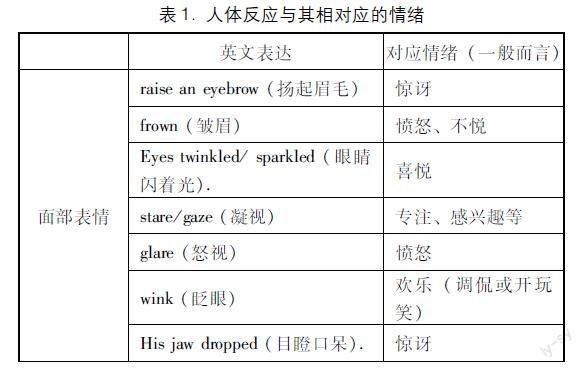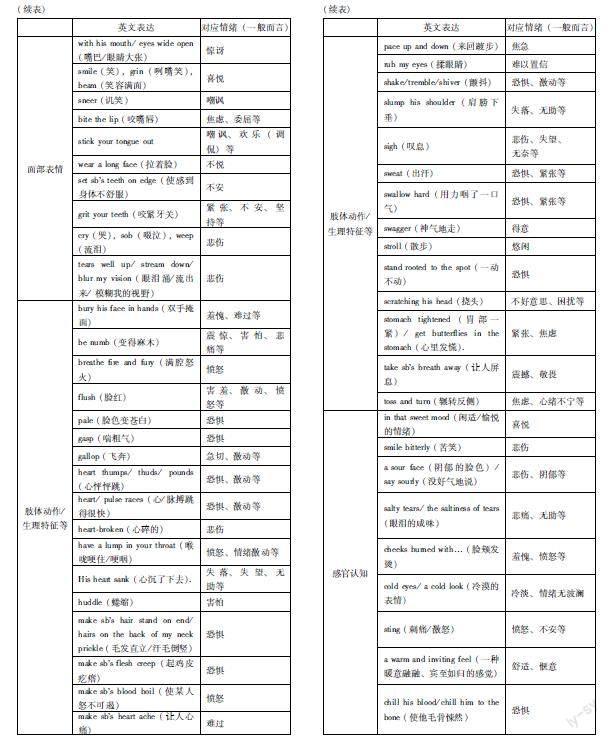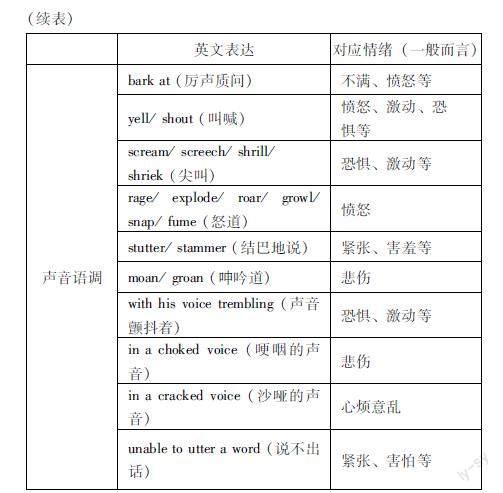续写中的情绪描写手法
牟子龙



读后续写属于记叙性文本,在故事中,人物的情绪往往随着情节的发展而产生相应的变化,例如,在2017年6月浙江卷中,主人公遭遇恶狼的袭击后成功在他人的帮助下脱险,其情绪至少经历了以下转换:遭遇恶狼时的震惊(shocked),与恶狼周旋时的害怕与紧张(terrified/anxious),劫后余生的庆幸(feel blessed to be alive),以及对施救者的感激(grateful)。加之,续写评分要求中有一项为“内容丰富”,并对学生的所用詞汇及语法结构的丰富性做出了要求,而情绪描写可以有效增加细节,丰富内容,因此是续写中是不可或缺的成分。
情绪描写,通常有“直陈式”(正面描写)和“婉描式”(侧面描写)两种,“直陈式”多通过表述情感的形容词或名词实现,而“婉描式”侧重人物的面部表情、感官感受、语言声音以及周遭环境等。以下将就这两种手法进行分点描述。
一、直陈式
“直陈式”手法胜在直接,例如:He was terrified. / He felt a sense of terror. (他感到害怕),但缺陷也很明显,即缺少语言丰富性。而情感隐喻表达可以有效解决这一问题。情感隐喻是文学作品中为生动形象地描述人类抽象的情感,而将其具象化的一种修辞表达。
1. 情感是一种力
人们受情感牵制,情感可以被隐喻成一种力,能控制、击败人类,此时情感是一个对手,甚至是统治者,表述这一意象的词有:consume (吞噬), choke/ suffocate (使人窒息), deprive (剥夺), grip (抓牢), get the better of (打败), get the best of (胜过), overcome (战胜), oppress (压迫), occupy sbs mind (占据某人的思绪), seize (抓住), take hold of (掌控), tear into pieces (撕成碎片), torment/ torture (折磨)等。以下是一些例句:
[例1] Rage consumed him (他无比愤怒).
[例2] She choked with sorrow (她因悲伤而哽咽).
[例3] Despair deprived him of his power of thinking (绝望剥夺了他思考的能力), with all sorts of nightmare pictures popping into his mind.
[例4] His mind was occupied with anger (愤怒充斥着他的脑海).
[例5] At the sight of the ferocious wolf, I was seized/ gripped by a strong sense of horror (被深深的恐惧感所控制) and my palms were sweating.
[例6] I was tortured/ tormented by feelings of intense guilt (被强烈的内疚感折磨着).
[例7] I felt torn (感到左右为难) between keeping the fish and letting it go.
情感作为对手,人们就会与之遭遇、并尝试与之斗争,这一类词有:battle with/ struggle with/ fight against (与之抗争), confront (直面、处理), curb/ swallow (抑制), conquer (战胜), contain (克制), endure (忍受), give way to (让步), resist (抵抗)等。以下是一些例句:
[例8] Living far from his family, he found the homesickness and distress were too overwhelming to resist/ contain/ endure (思乡之情和痛苦难以抗拒).
[例9] Alysia was unable to contain her excitement (抑制兴奋之情) and let out a yell of ecstasy.
[例10] Unable to confront his sorrow (处理悲伤之情), Jack quit his job and locked himself in the room, refusing to see anyone.
[例11] Curiosity killed the cat, but I just found it almost impossible to fight against it (抵挡好奇心).
[例12] He was making the greatest efforts to struggle/ battle with anger (克制愤怒), but it seemed that the latter would get the better of him.
[例13] With all the suffering he had encountered, his sanity finally gave way to hysterical anger and thunderous yells (他的理智最終被歇斯底里的愤怒和雷鸣般的喊叫所取代).
[例14] John finally had his fear conquered (战胜了恐惧) and was able to step out of his comfort zone.
[例15] He swallowed his doubts in front of her (不流露怀疑).
2. 情感与容器
人体就如同是收纳情感的容器,情感就是被收纳的物品,可以灌满容器,漫出容器,甚至从中爆裂而出;而当情感过于强烈时,也可能会沸腾,表述这一意象有:bubble/ brim with (洋溢着), boil (沸腾), explode/ erupt (迸发), engulf (包围/吞没), fill/ brim (充满), flood over/ sweep over/ wash over (涌上心头), overflow (漫出), overwhelm (淹没), ripple (扩散、涌起), surge (涌动), swell (充满), well up (涌上)。以下是一些例句:
[例1] She was bubbling/ brimming/ overflowing with excitement (兴奋不已).
[例2] We all exploded/ erupted into wild laughter (一下子大笑起来).
[例3] A gasp of astonishment rippled through (扩散开来) the crowd.
[例4] A wave of pride flooded/ swept/ washed over him (一阵强烈的自豪感涌上心头) as he watched his children.
[例5] Waves of tranquility washed over me (静谧的感觉流过我的周身), filling me with tenderness (使我内心充满柔情).
[例6] A ripple of sadness welled up inside him (他内心涌起一阵阵悲伤).
[例7] The loneliness and grief came in waves (孤独和悲伤不断涌上心头).
[例8] She could see her two sons swell with pride (充满了骄傲).
[例9] A sense of pride and happiness overwhelmed me (一种自豪感和幸福感淹没了我) and I gave him a wild smile.
[例10] She was boiling with anger/ rage/ fury (她怒不可遏).
3. 情感与负担
情感对人类而言,有时是一种负担,表达这一意象的词有:bear (忍受), be freighted with (充满;freight原义为货运), be burdened with (担负), hang heavy (感情积郁), unburden (倾诉)等。以下是一些例句:
[例1] I dont want to burden you with my worries (让你为我的烦恼操心).
[例2] Each word was freighted with anger (充满愤怒).
[例3] Despair hangs heavy in the stifling air (绝望的感觉积压在憋闷的空气中).
[例4] Telling the truth was a great weight off my shoulders (如释重负).
4. 情感与动物
情感的释放是悄然而至的,可以被类比为动物,表述这一意象的词有:creep (爬动), gnaw (咬), swallow/ devour (吞噬)等。又因为人是情感释放的主体,情感又像是困兽挣脱束缚(这亦可归入人与情感的斗争一类),归入这一类的词有:release/ unleash (发泄)等。以下是一些例句:
[例1] A slight feeling of suspicion crept over me (我渐渐地产生了一丝疑虑).
[例2] Selfdoubt began to gnaw away at her confidence (对自己的怀疑渐渐吞噬了她的自信心).
[例3] She was devoured/ swallowed by envy and hatred (她心中充满嫉妒和憎恨).
[例4] She burst into tears and released all her pent-up emotions (发泄出全部郁积起来的情感).
5. 情感与空间
对上下、前后、内外、深浅的空间的认知是人类较早获得的成长经验,因此空间认识常被用于隐喻抽象的情感,常见的有happy—up, sad—down的对应。以下是一些例句:
[例1] Im in high/ low spirits (情緒高涨/低落).
[例2] His spirits sank to the bottom (心情跌至谷底).
[例3] He blew up at me (冲我发火).
[例4] He flew into a rage (勃然大怒).
[例5] She came out of depression and sorrow (走出了沮丧和悲痛).
[例6] She fell into the abyss of despair (坠入了绝望的深渊).
[例7] I was in the whirlpool of remorse and despair (在懊悔與绝望的漩涡中).
6. 情感与色彩
脸色在情绪变化时会产生相应变化,例如,发怒时面红耳赤,恐惧时脸色惨白。除了脸色外,英文还存在其他以颜色隐喻情感的情况,以下是常见的一些情况:
[例1] Jessica was in a blue mood (处在悲伤的心绪中).
[例2] Her face turned bright red (脸上泛着红光).
[例3] She went as white as a sheet (脸色惨白).
[例4] Rory shot her a black look (愤怒地瞪了她一眼).
[例5] The fresh air had brought a healthy glow to her cheeks (两颊红润、精神焕发).
[例6] Jerry was green with envy (极为嫉妒的).
二、婉描式
“婉描式”手法可以在不提及情绪词的情况下,仍旧将所要传达的情感展现给观众,这通常经由人体变化以及环境描写实现。
1. 情感与人体
人类在情感流露的过程中,其身体也会产生一定变化,即心理与生理的统一,这种变化涵盖面部表情的变化、生理特征的变化、感官的感知变化、声音语调的变化等。下表是对这一类词汇/语块中的常用语的总结。
in a cracked voice (沙哑的声音)心烦意乱unable to utter a word (说不出话)紧张、害怕等以下是相关表达在语句中使用的具体实例:
[例1] She was flushing red (她的脸通红) to the roots of her hair and managed to stutter a reply (结巴地回复).
[例2] Mary leaned forward and tugged at (拉拽) the key, her heart thudding/ pounding/ hammering/ thumping (心怦怦直跳).
[例3] Dannys eyes widened (睁大了双眼).
[例4] I ducked/drooped my head (低垂着头), not sure what else I could do to help.
[例5] A frown (皱眉) now stood on his face.
[例6] She was on the verge of tears (几乎快掉眼泪了).
[例7] He was a little tonguetied (舌头打结) and replied in a quivering voice (颤抖的声音).
[例8] Her stomach tightened (胃痉挛) and immediately her face turned pale (脸色煞白).
[例9] Taking a deep breath (深吸了一口气), Mary pushed open the door and stepped inside.
[例10] He turned back and barked at (厉声质问) me, “What have you done? What have you have?”
2. 情感与自然环境及事物
人类的情绪可以由环境烘托。例如,喧嚣的环境可以烘托人物的喜悦或内心的烦躁,寂静则可能暗示了人物内心的不安,而刻画途中所见的美景可以侧面表达人物的闲适心境。除此之外,风雨雷电等自然现象可以反应人物的心境。在英文的情感隐喻中,喜悦常与晴朗、微风挂钩,例如:a sunny boy (阳光开朗的男孩), radiant (容光焕发的), breezy (轻松愉快的);雷电及暴风雨往往表示愤怒,例如:his thunderous expression (他那气势汹汹的表情), thunder at (怒斥);冰霜多与冷漠关联,例如:a frosty reply (冷淡的答复);云雾多是忧郁的象征,例如:a cloud of gloom (愁云)。以下是一些实例:
[例1] A silence fell across/ descended over (寂静降临/笼罩) the garden. [暗示不安、焦虑]
[例2] I looked out of the car window, winding rivers, lofty mountains and deep valleys (蜿蜒的河流、巍峨的山脉和深邃的山谷) entirely taking my breath away. [震撼、對自然的敬畏]
[例3] The weather had cleared, the sun was streaming down (阳光倾泻而下) and the sea was calm. [内心的平静、安心]
[例4] Jerry shone from his brow (喜上眉梢).
[例5] The fragrant breeze stroked our face gently (微风轻拂脸庞). [暗示欢乐的心绪]
[例6] The wind howled /roared (风咆哮着) all night, buffeting the window violently (猛烈地拍打窗户). [凸显环境的危险,显示人物的不安、焦虑等]
[例7] His face clouded over (阴郁) when the bad news came that he had been fired.
[例8] As the dark clouds rolled up (乌云翻滚), accompanied by a rumble of thunder and a sudden flash of lightning (伴随着隆隆的雷声和突如其来的闪电), it seemed as if I were watching a war of the elements, which held me entirely in their power. [不安、焦虑、对自然的敬畏]
[例9] The mountain peak was enveloped/shrouded in mist and clouds (笼罩在薄雾中与层云间). [可用于表示人物对自然的敬畏]
值得注意的是,在写作中,长短句往往是需要交替使用,因此不能彻底割裂“直陈式”与“婉描式”这两种手法,而是寻求一种“你中有我”的共存。以下通过一些长句说明。
[例1] Consumed with anger (被愤怒吞没), Jeremy banged his fist on the wall (捶打墙壁) and shouted hysterically (歇斯底里地喊叫), “Out! All of you!” [情感作为一种力量+肢体动作+声调变化]
[例2] In this deathly hush (在这死寂中), he could only hear his heart thudding faster than usual (听到他的心跳比平时更快). [环境+生理变化]
[例3] With palms sweating (手心冒汗) and legs trembling (双腿颤抖), he edged (缓慢行走) forward. [生理变化+肢体动作]
[例4] The fresh air (新鲜的空气) and gentle breeze (和煦的风) had brought a healthy glow to her cheeks (两颊红润、精神焕发) and lifted her spirits (使她情绪高涨). In that sweet mood (闲适的心境中), Mary strolled leisurely (悠闲地漫步) along the beach, unleashing all the bad moods that had taken hold of her (释放她所有的坏情绪). [直陈(情绪与色彩/空间/力量)环境+感官认知+肢体动作]
责任编辑 吴昊雷

